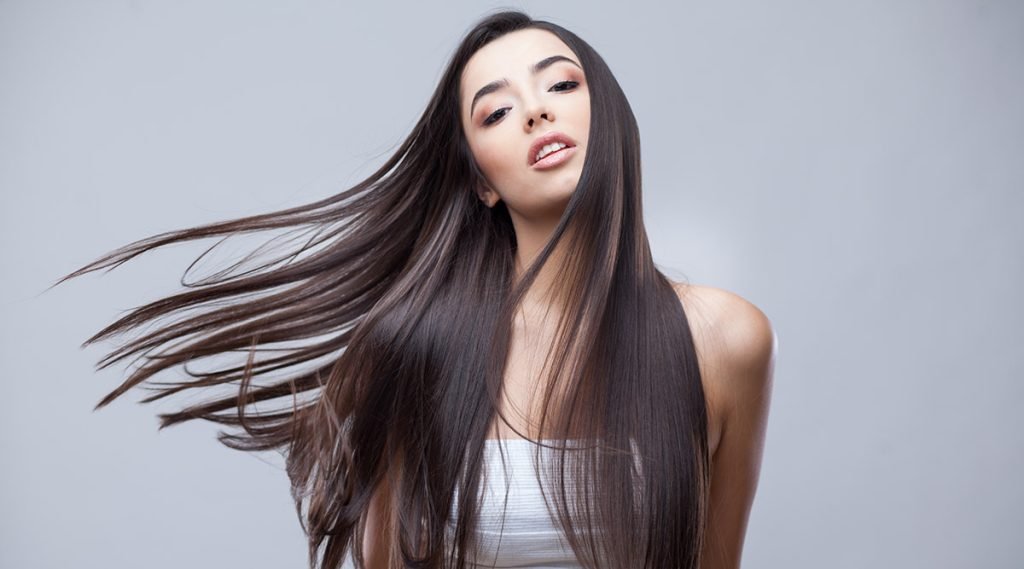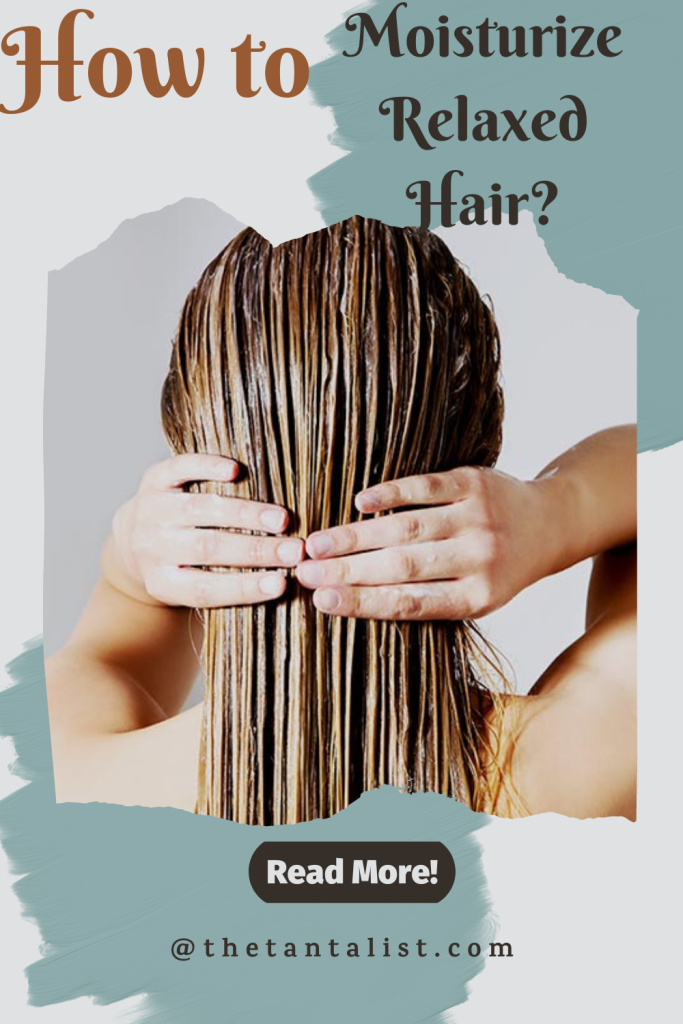Have you ever looked at someone and thought about how to hydrate relaxed hair that falls perfectly with the right health and shine? Relaxed hair might give a stunning appearance, but it is easily prone to becoming dry and beginning to break off. The relaxing process can adversely affect the hair’s natural moisture balance. As a result of the chemical treatments that go along with relaxation, the hair loses some of its ability to retain moisture naturally.

However, to retain the health and vitality of relaxed hair, a unique approach to handling moisture is needed. This guide explores the best practices and steps on how to moisturize relaxed hair so that hair will remain healthy and dry for a long time.
Step by Step Guide
Let’s look into some of the most significant steps for how to moisturize relaxed hair without weighing it down:
1. Understanding Hair Porosity
The correct regime on how to moisturize relaxed hair is based on the knowledge of the hair porosity level. Hair porosity refers to the hair shaft’s capability of absorbing and retaining moisture. There are three main categories of hair when you are looking for methods on how to keep relaxed hair moisturized all day:
- Low porosity hair: This hair type is extremely dry, containing a tightly closed cuticle, reducing moisture intake. Low porosity hair responds best to lightweight water-based products.
- Medium porosity hair: This hair type corresponds to a moderate category, which easily absorbs and retains moisture with different shampoos and conditioners.
- High-porosity hair: This hair type has a lifted cuticle, so it can absorb moisture quickly but cannot retain it well. It should be hydrated using thick moisturizers and creams.
2. Gentle Cleansing:
Hair cleansing is necessary to remove debris and the accumulation of hair products. It is also useful to avoid over washing, as this might damage relaxed hair by removing its natural moisture. Use sulfate-free shampoos specifically designed for relaxed hair. Gentle cleansers are also useful in washing off impurities without harming the skin’s moisture content.
3. Deep Conditioning:
Moisturizing treatments are an essential aspect when it comes to relaxed hair care. These intensive treatments replenish the necessary moisture at the hair cuticles for fiber’s elasticity and manageability. For better treatment, it is advised to have a deep conditioning session done at least once a week.
Try to look for ingredients such as shea butter or coconut oil to moisturize the skin and glycerin or aloe vera to nourish and soften the skin. The first thing you should do when you are puzzled about how to moisturize relaxed hair is divide your hair into sections and apply a lot of the deep conditioner onto the hair; put on the plastic cap to maximize the absorption of the conditioner into the hair strand and let it sit for about 20-30 minutes.
4. Locking in Moisture:
Hair care is not just a matter of applying moisturizers, as is often assumed. It is advised to apply a leave-in conditioner or a styling cream to seal the moisture and, ultimately, the hair cuticle so it does not dry throughout the day. These products sit on the hair longer and provide the hair with the moisture and healthy shine it requires.
5. The Power of Natural Oils:
Natural oils such as Jojoba, Argan, and Grapeseed contain fatty acids that can easily enter the hair shaft and give the hair an extra boost of shine and health. While you are thinking about how to moisturize relaxed hair, First, apply the oil to your palms and a generous portion to your hair, starting from the tips, as it normally gets very dry.
6. A Mid-Week Moisture Boost
A great quality moisturizing spray is something you must try because it makes your hair look fresh even when you have not washed it for a while. It is preferable to look for sprays that contain ingredients that preferably feed the hair, such as aloe vera or rose water. Always ensure you have a spray bottle in your handbag to dampen and moisturize your hair if you are in a dry climate and can’t think of anything how to moisturize relaxed hair.
Conclusion
Incorporating these steps, especially when you consider how to moisturize relaxed hair into your hair maintenance schedule, will ensure that your relaxed hair is optimally moisturized and healthy and hence easy to manage. Remember, consistency is key! Deep conditioning, consistent mild shampooing, and good use of hair moisturizer will go a long way towards making the hair look like the beauty it is supposed to be in relaxed hair.
Frequently Asked Questions
1. Is water enough to moisturize my relaxed hair?
Although water is one of the most significant ingredients for healthy hair, it does not possess sufficient nutrients or humectants to properly moisturize relaxed hair. Still, water-based products can be helpful if they are complemented with other emollient ingredients for the best outcome.
2. Is it possible to over-moisturize relaxed hair?
The hair may become greasy, but since most relaxed hair types need daily moisturizing, it is not something which should be avoided. To achieve this strategic balance, one has to use lightweight products and resist creating product layers.
3. Does the oil make hair greasy when applied?
Using the right kind of oil in the right quantity does not make your hair appear oily. It should be applied on the ends; only a dime-sized amount should do for the hair length.
4. Can the same products be used on relaxed hair as those that are suited for natural hair?
Natural hair and relaxed hair are drastically different because of the way they react to various products and treatments. Relaxed hair is more porous than natural hair and dries up easily, making it brittle. Therefore, the question arises of how to moisturize relaxed black hair and what products are needed to moisturize it.
5. Are there symptoms that can tell you that your relaxed hair is dehydrated?
When you are confused about when and how to moisturize relaxed hair daily, look for these signs that indicate dehydrated relaxed hair:
- Dryness and dullness: Hair ends up being dull and does not have any luster.
- Brittle strands: Hair feels slimy and delicate, which makes it easy to break off.
- Increased split ends: Hair split ends also become visible.
- Scalp Dryness: Irritation can occur in the scalp, leading to itching and the formation of dandruff.
- Tough management of hair: Growing out relaxed hair is tough because it becomes hard to manage and style with time.
6. What role does diet play in the overall health of the relaxed hair?
A balanced diet that provides the body with all essential nutrients also helps enhance the quality of hair outside. Protein, biotin, and omega-3 fatty acids are some of the nutrients that are good for hair.
7. Are heat-styling products safe if you have relaxed hair?
Heat can be very bad for hair, especially relax hair type. However, if you still want to use heat styling, ensure you use heat protectant spray and minimize the heat as much as possible.
Pin this on Pinterest

Suggested:
- How to Moisturize Relaxed Hair
- Top 10 Clarifying Shampoo for Relaxed Hair Worth to buy this Summer
- How often should you Wash Relaxed Hair?
- 11 Best Clarifying Shampoo for Oily Hair
- 10 Best Shampoo for Tape Extensions




